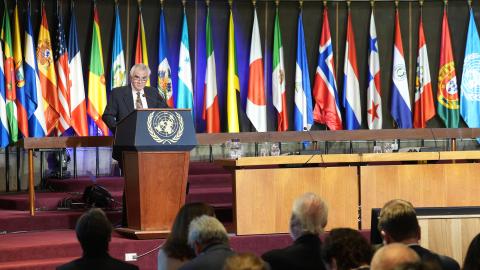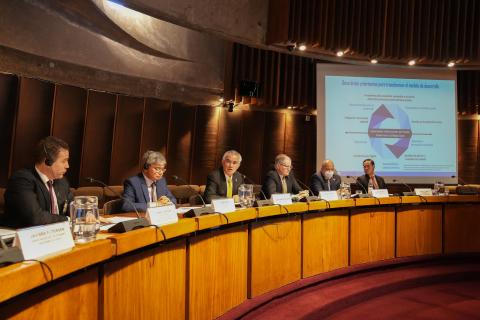News
In just half a century, the Republic of Korea has gone from being one of the poorest countries on the planet to becoming a global actor, with a solid industrial base and a prominent presence in new technologies. It serves an example that can inspire debate about development in Latin America and the Caribbean, participants said during the international seminar “Trade, Industrialization and Green Growth: Exploring Opportunities for Cooperation between the Republic of Korea and Latin America,” which was held on January 22, 2015, at the headquarters of the Economic Commission for Latin America and the Caribbean (ECLAC) in Santiago, Chile.
Senior officials from the Ministries of Trade, Industry, Science and Technology, scholars, and experts from eight Latin American countries and the Republic of Korea—among them from the Korea Institute for International Economic Policy (KIEP) and the Korea Environment Institute (KEI)—discussed the relevance of the Asian country’s experience for the region in three public policies areas: the internationalization of the economy, smart and technological cities, and green growth.
The event, which is part of a cooperation program started in 2011 between ECLAC and the Republic of Korea, was inaugurated by the Chief of the Division of International Trade and Integration at the regional United Nations organization, Osvaldo Rosales, and by Korea’s Ambassador to Chile, Ji-Eun Yu.
“The main lesson from the Korean case is that convergence in per capita income with industrialized economies is possible,” stressed Osvaldo Rosales. In 1970, the Republic of Korea’s per capita income represented just 9% of that of the United States. Meanwhile, Latin America’s per capita income was 15%. Today, Korea’s per capita income represents 53% of the U.S. level while the regional figure continues to be just 13%, he said.
In the last three decades, Korea’s export basket has gone from being mostly formed by natural resources or manufactured goods with low technological content (textiles in particular), to 80% of manufactured goods with high or medium technological content.
In addition, in 2008 the Republic of Korea put green and low-carbon growth at the center of its strategy, making it a pioneer today. The country took a systemic view that includes the energy, industrial, agricultural, transportation, construction, urban development, educational and health sectors, among others.
The Ambassador of the Republic of Korea to Chile, Ji-Eun Yu, thanked “all the work and efforts that ECLAC carries out daily to foment development and prosperity in Latin America and the Caribbean,” and he launched an invitation to forge a joint vision of cooperation in search of an ideal in terms of progress.



